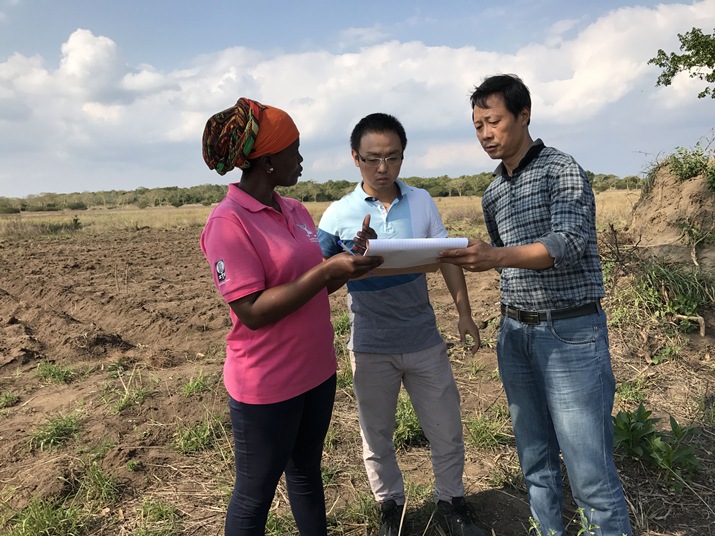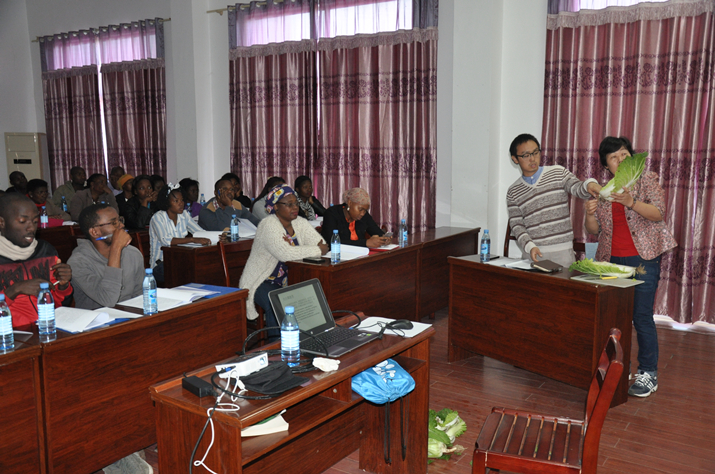
|
||||||||||
| Home Nation World Business Opinion Lifestyle ChinAfrica Multimedia Columnists Documents Special Reports |
|
||||||||||
| Home Nation World Business Opinion Lifestyle ChinAfrica Multimedia Columnists Documents Special Reports |
| Africa |
| Getting the Message Across |
| Behind the scenes, interpreters and translators are a centerpiece of Chinese projects in Africa |
| By Li Xiaoyu ·2017-12-26 |

In theory, everything should have worked smoothly. But in practice, Chinese experts only speak very little English and Burundi is a French-speaking country. Fortunately, Shi Li and Du Lanlan, two Chinese interpreters in their 20s, are there to save the day.
"They do their utmost to facilitate communication. They are an indispensable part of the process," said Ndayikeje, who now considers them friends. "We work together in the field every day. This helps build friendship!"
Upon their arrival in Burundi in 2015, the two young interpreters faced a daunting challenge: translating highly-specialized vocabulary related to agriculture. "I thought I knew agriculture, because I grew up in the countryside," said Du. "But when it is treated as a scientific discipline, it is a completely different thing."
A meaningful work
Each one of the six Chinese experts in their team has their own specialty, such as livestock and rice farming. Relevant terminologies are therefore both complex and technical. Moreover, academic terms are not widely used among local people, which made their task even harder. The only way for the two interpreters to enrich their agricultural references was to remain in constant contact with both Chinese and Burundian experts.
In spite of all difficulties, the two young women have each translated nearly 300,000 words from Chinese into French in less than two years, including everything from research training documents to email correspondence. And this task was mainly carried out at night time, because of the frequent electricity cuts during the day.
When asked the reason for such diligence, Du was quick to answer: "These documents are manuals which local farmers and technicians can use to find solutions to their problems. It's very rewarding to feel useful."
A kind of shock absorber
For Li Xiaoming, a 33-year-old Chinese-French interpreter, terminology was far from being his main concern. After stints in Niger and Mauritania, he was dispatched to Djibouti in 2015 to assist the Chinese agricultural cooperation mission based there.
"From my point of view, specialized or technical terms are not a problem. We can always make ourselves understood," he said. "On the other hand, to be the intermediary linking two ways of thinking born out of completely different cultures is a daily challenge."
He recalls a telling example. "One time, in the midst of a major analysis of samples, Djiboutian technicians suddenly stopped working to go to the mosque." The move seemed strange to Chinese experts.

Chen Yangyang interprets in a training course
Li then had to step in and explain that almost all Djiboutians are Muslims and that it was quite normal here for technicians to stop whatever they were working on to go pray. Thanks to his tactfulness and explanations, Chinese agronomists were able to better understand what was going on.
"In situations like this, our role is to serve as a kind of 'shock absorber' to avoid cultural misunderstandings," said Chen Yangyang, who has been working with the Chinese agricultural experts in Mozambique for nearly two years.
The 28-year-old Portuguese language interpreter still remembers the difficulty he had in explaining to the driver of the mission that it was a "freelance" contract, paid on an hourly basis, and not a fixed salary. But the driver did not seem to understand, and insisted on working eight hours a day. For him, a flexible schedule was not in his interests. For their part, mission members blamed him for being too rigid and lacking pragmatism.
"In this case, the difficulty was that you cannot translate everything, especially when it comes to complaints. Otherwise, there is a risk of creating misunderstandings and even inducing conflict. Sometimes, less is more," explained Chen.
"Our role is to explain the demands of each party to try to find a compromise." A month later, Chen finally managed to get the driver to sign.
A cultural hyphen
In their quest for common understanding, interpreters are natural observers of society. "I try to look at the society in which I live from various angles, such as religion, which holds a very important place here. Then everything becomes easier to understand for me," said Li.
For his part, Chen maintains constant relations with local government offices to stay informed of specific administrative rules. "In a nutshell, to better communicate with the people in the countries where we work, we need to observe more and think more," said Chen.
At the same time, interpreters also have a responsibility to local people, to remove some of their doubts and help them better understand China. "I answer a lot of questions on China and the Chinese on a daily basis, and I keep them up-to-date of what's going on over there," said Chen.
"I am convinced that younger generations will communicate much more easily and understand each other better. In the meantime, I try to bring my humble contribution to this cause by serving as a kind of 'cultural hyphen,'" he added.
|
||
| About Us | Contact Us | Advertise with Us | Subscribe |
| Copyright Beijing Review All rights reserved 京ICP备08005356号-5 京公网安备110102005860号 |